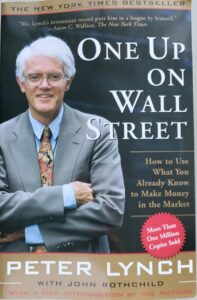The famous fund manager Peter Lynch is a gold mine for investing knowledge, alongside investors such as Howard Marks and Charlie Munger.
I gathered these from his books One Up on Wall Street and Beating the Street, and some I found around the web that seemed to check out.
So, without further ado, here are the best Peter Lynch quotes about long-term investing. Enjoy!
“Long-term investing has gotten so popular, it’s easier to admit you’re a crack addict than to admit you’re a short-term investor.”
“Just because you buy a stock and it goes up does not mean you are right. Just because you buy a stock and it goes down does not mean you are wrong.”
“The typical big winner in the Lynch portfolio (I continue to pick my share of losers, too!) generally takes three to ten years or more to play out.”
“Go for a business that any idiot can run – because sooner or later any idiot probably is going to be running it.”
“A stock market decline is as routine as a January blizzard in Colorado. If you’re prepared, it can’t hurt you. A decline is a great opportunity to pick up the bargains left behind by investors who are fleeing the storm in panic.”
“Your ultimate success or failure will depend on your ability to ignore the worries of the world long enough to allow your investments to succeed.”
“Nobody can predict interest rates, the future direction of the economy or the stock market. Dismiss all such forecasts and concentrate on what’s actually happening to the companies in which you’ve invested.”

“People who succeed in the stock market also accept periodic losses, setbacks, and unexpected occurrences. Calamitous drops do not scare them out of the game.”
“Time is on your side when you own shares of superior companies.”
“What makes stocks valuable in the long run isn’t the market. It’s the profitability of the shares in the companies you own. As corporate profits increase, corporations become more valuable and sooner or later, their shares will sell for a higher price.”
“This is one of the keys to successful investing: focus on the companies, not on the stocks.”
“By the way, the odds against making a living in the day-trading business are about the same as the odds against making a living at racetracks, blackjack tables, or video poker.”
“In the long run, a portfolio of well-chosen stocks and/or equity mutual funds will always outperform a portfolio of bonds or a money-market account. In the long run, a portfolio of poorly chosen stocks won’t outperform the money left under the mattress.”
“It takes remarkable patience to hold on to a stock in a company that excites you, but which everybody else seems to ignore. You begin to think everybody else is right and you are wrong. But where the fundamentals are promising, patience is often rewarded.”

“The stock market really isn’t a gamble, as long as you pick good companies that you think will do well, and not just because of the stock price.”
“There is always something to worry about. Avoid weekend thinking and ignoring the latest dire predictions of the newscasters. Sell a stock because the company’s fundamentals deteriorate, not because the sky is falling.”
“You should not buy a stock because it’s cheap but because you know a lot about it.”
“The trick is not to learn to trust your gut feelings, but rather to discipline yourself to ignore them. Stand by your stocks as long as the fundamental story of the company hasn’t changed.”
“All you need for a lifetime of successful investing is a few big winners, and the pluses from those will overwhelm the minuses from the stocks that don’t work out.”
“The list of qualities (an investor should have) include patience, self-reliance, common sense, a tolerance for pain, open-mindedness, detachment, persistence, humility, flexibility, a willingness to do independent research, an equal willingness to admit mistakes, and the ability to ignore general panic.”
“I think you have to learn that there’s a company behind every stock, and that there’s only one real reason why stocks go up. Companies go from doing poorly to doing well or small companies grow to large companies.”
“In the long run, it’s not just how much money you make that will determine your future prosperity. It’s how much of that money you put to work by saving it and investing it.”




